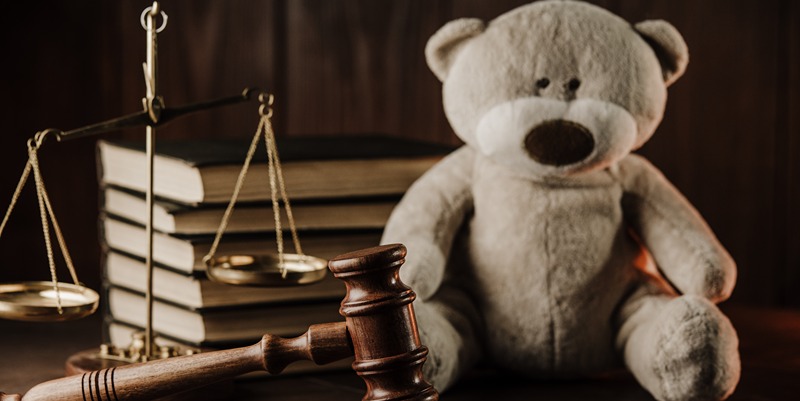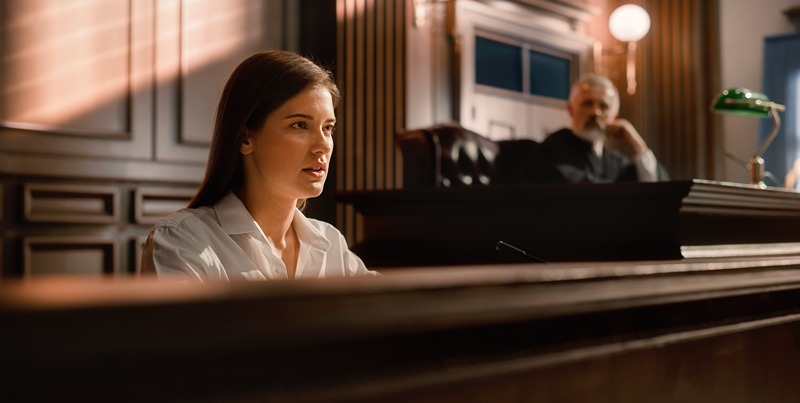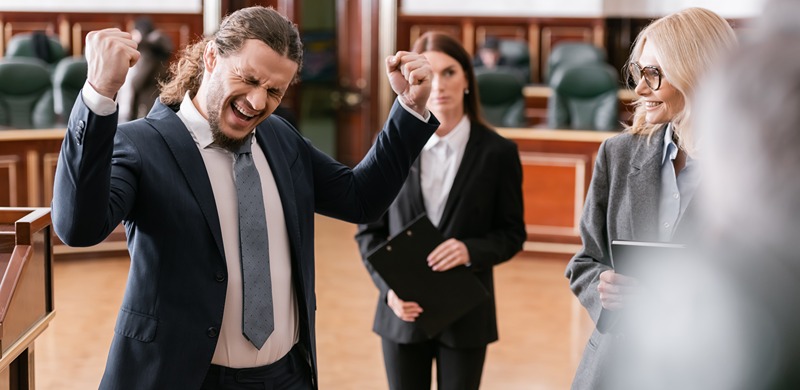The Reliability of Child Witness Testimony in Criminal Cases

This article discusses the following:
- Types of Criminal Cases Where a Child Witness Might Testify
- Issues Related to the Reliability of Child Testimony in Criminal Cases
- Can a Child Witness Be Excluded from Testifying?
- Children Testifying in Sex Crime Cases
- Examples of Inconsistent Statements in Sex Offense Cases
- Defenses against a Child's Witness Testimony
- FAQs About Child Testimony
- How a Criminal Defense Attorney Can Help
At Kolsrud Law Offices, we understand that facing a criminal charge where a child is called to testify can be an especially challenging and emotional experience.
Arizona Revised Statute § 13-4251 generally considers a child as capable of testifying in court. However, it's important for defendants to understand that the reliability of a child's testimony can be questionable due to factors like their mental development, susceptibility to outside influence, and memory issues.
According to the National Registry of Exonerations, an alarming 13% of all wrongful convictions that were overturned by DNA evidence had involved a child witness.

Types of Criminal Defense Cases Where a Child Witness Might Testify
Child witnesses can play a role in various types of criminal defense cases, not just those involving alleged offenses against minors. While their testimony may be presented with the best of intentions, the reliability of such accounts is often open to question.
Below are some types of cases where a child witness might be called to testify:
➤ Sex Offense Cases: These are perhaps the most common cases involving child witnesses. Whether it's an accusation of molestation, indecent exposure, or sexual conduct with a minor, children are frequently called to testify in sex crime cases.
➤ Domestic Violence Cases: Children might be witnesses in cases involving disputes between parents or other family members. They could be asked to discuss events leading up to a physical altercation or arguments they have observed.
➤ Drug-Related Cases: In some situations, children might be present during the execution of a search warrant and could be called to testify about what they saw, particularly if it relates to the possession or distribution of controlled substances.
➤ Theft or Burglary Cases: If a child was present during an alleged theft or burglary, their testimony could be used to either support or refute the charges. However, the inherent inconsistencies often found in child testimonies can play a significant role in these cases.
➤ Child Endangerment or Neglect Cases: Children can also testify in cases involving their own welfare. In these situations, they might speak about their living conditions, treatment by caregivers, or any witnessed drug or alcohol abuse.
Contact us today to schedule a
FREE CONSULTATION and learn
how we can help you.
Issues Related to the Reliability of Child Testimony in Criminal Cases
A child witness may be considered competent to testify, but their credibility can be a point of contention. Several issues are associated with child testimony:
➤ Limited Vocabulary: Children may lack the language skills needed to accurately describe what they have seen or experienced, which can create gaps or inconsistencies in their accounts.
➤ Susceptibility to Coaching: Children are more susceptible to the influence of authority figures. For example, in the infamous McMartin Preschool case in the 1980s, multiple children initially provided testimony that led to charges of sexual abuse. However, it was later revealed that suggestive questioning had contributed to false accusations.
➤ Malleable Memories: The malleability of children's memories is another significant concern. In the 1995 case of State v. Michaels, a teacher was accused of sexual misconduct based on the testimony of her preschool students. The New Jersey Supreme Court later overturned the conviction, citing concerns about the reliability of the children's memories and the suggestive interviewing techniques used.
➤ Emotional State: Children are more emotionally volatile and may be easily frightened or stressed, affecting their ability to recount events clearly. Emotional factors were brought into consideration in the 2001 case of Maryland v. Craig, where the U.S. Supreme Court ruled that a child's fear of facing the defendant could justify the use of closed-circuit television for testimony.
➤ Perception and Interpretation: Children may not fully understand the events they are witnessing, leading to inaccurate or misleading testimonies. In the 1990 case of People v. Jones, the child witnesses' inability to accurately interpret events led to the wrongful conviction of a man for child abduction and sexual assault, which was later overturned.
Can a Child Witness Be Excluded from Testifying?
The exclusion of a child's testimony in criminal cases is primarily guided by Arizona Revised Statute § 13-4253, which generally considers children competent to testify. Nevertheless, there are specific situations where a child may not take the stand.
- For example, a child may first undergo a competency hearing to evaluate their understanding of truth and falsehood, as well as their ability to recall and describe events accurately. If they are found to be incompetent, the court can exclude their testimony.
Another factor that might prevent a child from testifying is the potential for trauma or emotional distress. If the court believes that the act of testifying could significantly harm the child emotionally or psychologically, they may either exclude the child or permit alternative methods like closed-circuit television for the testimony.
- Additionally, if there's compelling evidence indicating that the child's testimony has been manipulated or coached by parents, guardians, or anyone else, the court could choose to disallow the child's input.
In some cases, the relevance of the child's testimony to the facts of the case may also be scrutinized. If it is deemed that the testimony does more to prejudice the proceedings than to aid them, then the child may not be allowed to testify.
Lastly, the defendant's constitutional rights, such as the right to a fair trial, can also serve as a basis to argue against including the child's testimony.

Children Testifying in Sex Crime Cases
Involving children as witnesses in sex crime cases adds another layer of complexity to an already sensitive legal matter. According to the U.S. Department of Justice, children are victims in 67% of all sexual assault cases reported to law enforcement agencies. However, their role as witnesses can be fraught with challenges concerning credibility and emotional impact. Here are some points to consider:
➤ Expert Witnesses: The high incidence of child involvement in sex crimes often leads to the inclusion of expert witnesses who can assess the reliability of the child's testimony. Experts in child psychology and trauma can offer crucial insights into the child's emotional state and susceptibility to outside influence.
➤ Legal Safeguards: To reduce potential trauma, Arizona courts might allow children to testify via closed-circuit television or have a support person present, as stipulated in Arizona Revised Statute § 13-4253.
➤ Defense Challenges: Defense teams are tasked with the delicate balance of challenging a child's credibility without causing further harm. Given that false accusations occur in approximately 2-10% of all cases.
➤ Age and Maturity: Age plays a significant role in the child's capability to provide reliable testimony. Studies indicate that children under the age of seven are less likely to accurately remember events, which could be a significant factor in the court's evaluation of their competency to testify.
➤ Corroborating Evidence: Due to the potential reliability issues with child testimony, corroborating evidence is often required. Medical examinations, physical evidence, and other eyewitness accounts can help substantiate or challenge the child's statements.
Examples of Inconsistent Statements in Sex Offense Cases
In cases involving sex offenses, the stakes are incredibly high for both the accused and the accuser. It's important to consider the potential inconsistencies in statements made by child witnesses.
Let's look at some common scenarios where inconsistencies might arise:
➤ Different Accounts to Different Authorities: Imagine a situation where a child initially tells a teacher nothing inappropriate occurred but later tells the police a different story. The discrepancy between these two statements can be used to challenge the reliability of the child’s testimony.
➤ Contradictions During Cross-Examination: During court proceedings, a child might provide a sequence of events that contradicts their initial statement to investigators. For instance, a child may first claim that a certain event happened in the daytime but later state it happened at night.
➤ Inconsistencies in Descriptions: A child may describe the accused's physical appearance, location, or timing of the event differently to different people—perhaps once to parents and again differently to the authorities. These inconsistencies can raise doubts about the reliability of the child's account.
➤ Varying Levels of Detail: Sometimes a child might initially offer only a vague account but later provide an exceptionally detailed description, including elements not previously mentioned. While memories can indeed become clearer over time, drastic changes in the level of detail can be seen as inconsistencies that undermine the child’s credibility.

Defenses Against a Child's False Testimony
Facing a criminal charge that relies on the testimony of a child requires a well-planned defense strategy.
Here are some key strategies to consider:
➤ Questioning the Child's Ability to Testify: You can challenge whether a child is competent to be a witness. This might involve examining their mental capacity, grasp of truth and falsehood, and understanding of the court proceedings.
➤ Pointing Out Inconsistencies: As discussed earlier, children can often give different accounts of the same event. Showing these inconsistencies in court can weaken the child's testimony.
➤ Expert Opinions: Using psychologists or child behavior experts can offer valuable perspectives on how reliable a child's testimony might be. These experts can discuss how children understand and remember events, as well as how easily they might be influenced.
➤ Other Witnesses: Introducing other people who can offer an alternative account of events or who can speak to the child's tendency for dishonesty can also be helpful.
➤ Examining Interview Methods: Sometimes, children are led or prompted by the questions they're asked during interviews. Showing that the methods used to interview the child were flawed can cast doubt on their testimony.
FAQs About Child Testimony
Is a child's testimony enough to convict someone in Arizona?
- No, a child's testimony is generally not sufficient on its own to convict someone. Additional evidence is usually required, and the testimony is subject to scrutiny for reliability and credibility.
Does Arizona have a minimum age for a child to testify?
- Arizona Revised Statute § 13-4253 does not specify a minimum age for a child to testify. However, the court will assess the child's competency to testify on a case-by-case basis.
Can a child testify via video link in Arizona courts?
- Yes, under certain circumstances and with court approval, a child may be allowed to testify through closed-circuit television to minimize trauma.
Is a child witness cross-examined in the same way as an adult?
- While cross-examination is permitted, attorneys and judges usually take a more delicate approach when questioning child witnesses to avoid leading or confusing them.
What steps can a defense attorney take to challenge a child's testimony?
- A defense attorney can challenge a child's testimony by questioning the methods used to collect their statements, assessing their cognitive and emotional state, and introducing expert witnesses on child psychology.
How can juries assess the reliability of a child witness?
- Juries should consider factors like the child's age, cognitive development, and the circumstances under which the testimony was obtained, among others.
Can a parent or guardian be present while a child testifies?
- This is generally at the discretion of the court. Sometimes a parent or guardian may be allowed to be present to provide emotional support to the child.
Is a child's testimony more likely to be believed in certain types of cases?
- No, the credibility of a child witness is assessed based on the same factors, regardless of the type of case. However, certain cases like sexual assault may introduce additional complexities.
Can the defense request a psychological evaluation of the child witness?
- Yes, a defense attorney may request a psychological evaluation to assess the child's competency and reliability, although the court has the final say on whether to grant this request.
What happens if a child recants their testimony?
- If a child recants their testimony, it could lead to a new trial or even the overturning of a conviction, depending on the significance of the testimony to the case.

How a Criminal Defense Attorney Can Help
If you're facing a criminal case where a child witness is part of the evidence against you, safeguarding your best interests is our priority at Kolsrud Law Offices. Our criminal defense lawyers have the experience to protect your constitutional rights under the Arizona legal system.
Child testimonies can often be unreliable, making it crucial to have expert advice. We offer a free initial consultation and are always available to discuss your confidential case. Call us at 480-999-9444
An award-winning criminal defense attorney Since 2006
Why Choose Josh Kolsrud
With over 100 jury trials to his name, and years of experience as a state and federal prosecutor, Josh understands the law, the legal process, and your rights. Josh is also committed to representing every client with utmost integrity and dedication
Experience
Josh has prosecuted major crimes on the state and federal level, led a successful anti-human sex trafficking operation that saved lives, and argued before countless juries and justices for his clients
Expertise
Josh is an expert in both Arizona and federal criminal law, and is ready to put that expertise to work for you.
Dedication
As a prosecutor, Josh saw far too many defendants lose their livelihood due to poor representation. Josh will always give every client his complete attention and effort
Get a Free Initial Consultation:
Complete our form below to get a free case review.
or call us at (480) 999-9444.
